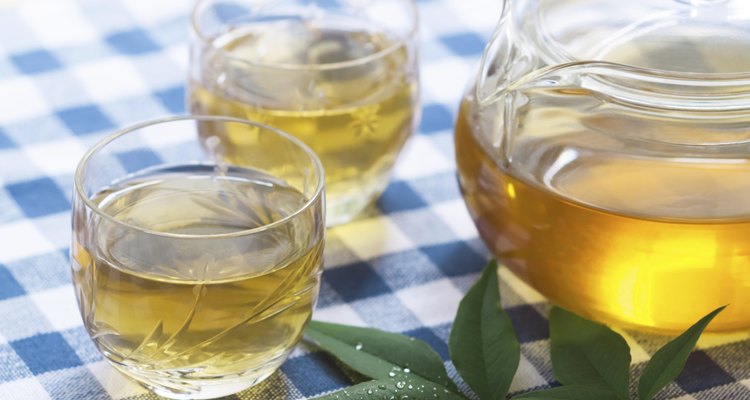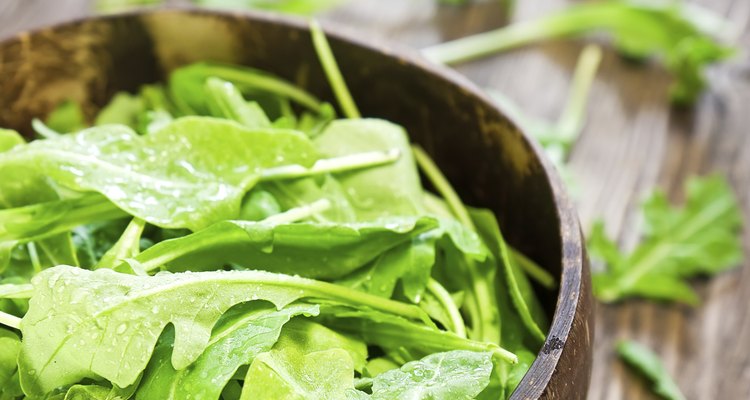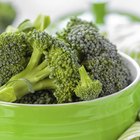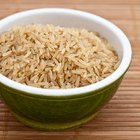
LittleBee80/iStock/Getty Images
Jaundice can cause both the skin and the whites of your eyes to turn yellow due to bilirubin -- a chemical component of hemoglobin. During the breakdown of red blood cells, the body produces more as replacements. Several conditions can attribute to this symptom, and you should visit your physician immediately should yellowing appear. You can also eat several foods to help prevent jaundice.
Citrus Fruits

mady70/iStock/Getty Images
Citrus fruits and their juices are commonly prescribed homeopathic remedies for jaundice. Since this symptom is generally indicative of poor liver function, eating citrus fruits can help stimulate bile production for proper detoxification of cellular waste, according to Lila Matthew and T. Radha in their book "Fruit Crops." Citrus fruits such as oranges, lemons and limes are abundant in antioxidants and help to flush the liver and digestive tract. The authors recommend replacing one meal a day, preferably breakfast, with citrus fruits in lieu of fatty items like sausage, pancakes or pastries.
Whole Grains

gorinov/iStock/Getty Images
Whole grains contain an ample amount of dietary fiber, which is essential in regulating the digestive tract for productive and regular bowel movements. In the book "Linda Page's Healthy Healing," naturopath Linda Rector-Page advocates eating whole grains like oats, wheat and barley to prevent further autointoxication that leads to jaundice. The author suggests regularly drinking barley tea or eating whole-grain cereals to prevent jaundice from developing.
Dark Green Leafy Vegetables

Preto_perola/iStock/Getty Images
Dark green leafy vegetables include the varieties broccoli, arugula, romaine lettuce, spinach, kale, chard and collard greens. The Center for Young Women's Health reports that these vegetables are especially rich in insoluble fiber; magnesium; potassium; vitamins A, C, E and K; and iron. The iron content in spinach is particularly beneficial, as it helps to form hemoglobin. In the book "Diet Management Guide," Dr. Rajiv Sharma recommends eating spinach, asparagus and other green vegetables to aid in digestion and cleanse the liver.
Related Articles

What Foods Have Glycoproteins?

L-Lysine for Hair Growth

Nutrition Information on Blueberries

Foods to Avoid to Prevent Gout

Foods That Are Good for Arthritis Pain ...

How to Reduce Acne Inflammation

Are There Foods That Heal Age Spots?

Foods Rich in Magnesium & Phosphorus

High-Alkaline, Low-Acid Foods

What Vitamins Help the Liver?

Food Sources of Betaine

Chinese Remedies for Lines & Wrinkles

Wild Yam for Hair Growth

The Best Vitamins for Sinuses

Can Age Spots Be Reversed?

Benefits of Indian Sarsaparilla

Does Milk Thistle Help Skin?

Which Vitamins Can Help Reverse ...

Can You Change Skin Tone with Food?

Skin Benefits of Eating Coconut Oil
References
- "Fruit Crops"; Lila Mathew and T. Radha; 2007
- "Linda Page's Healthy Healing"; Linda Rector-Page; 2000
- "Diet Management Guide"; Dr. Rajiv Sharma; 2005
Writer Bio
Skyler White is an avid writer and anthropologist who has written for numerous publications. As a writing professional since 2005, White's areas of interests include lifestyle, business, medicine, forensics, animals and green living. She has a Bachelor of Arts in anthropology from San Francisco State University and a Master of Science in forensic science from Pace University.
Photo Credits
LittleBee80/iStock/Getty Images